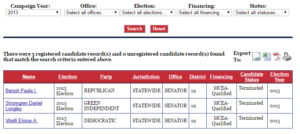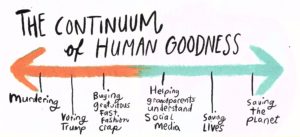For the last 20 years, Yes! Magazine has been at the forefront of providing alternatives to the corporatocracy. It regularly provides news of alternatives to the big corporate choices in banking, food, housing, and work. Only in electoral politics does Yes! Magazine fail to understand that there are non-corporate alternatives. I have had a private dialogue with them previously about their myopia when it comes to electoral politics, but it seems that discussion needs to be expanded. Yes! Magazine’s reporting continues to reinforce the corporate media mythology that the only choice in politics is between the two corporately-funded parties: the Republican Party and the Democratic Party.
Maine Clean Election Act
The current issue of Yes! Magazine is dedicated to showing local solutions in all 50 states. I was excited to read about the Clean Election Act campaign in Maine. The State of Maine describes Clean Election funding in the following way:
The Maine Clean Election Act (MCEA) established a voluntary program of full public financing of political campaigns for candidates running for Governor, State Senator, and State Representative. Maine voters passed the MCEA as a citizen initiative in 1996. Candidates who choose to participate may accept very limited private contributions at the beginning of their campaigns (seed money contributions). To become eligible, candidates must demonstrate community support through collecting a minimum number of checks or money orders of $5 [or} more made payable to the Maine Clean Election Fund (qualifying contributions). After a candidate begins to receive MCEA funds from the State, he or she cannot accept private contributions, and almost all goods and services received must be paid for with MCEA funds.
We at Wilderside first heard about the Clean Election Act from John Eder when he was visiting Long Island a number of years ago. Eder was a member of the Maine House of Representatives for two terms, and as such was the highest elected Green Party member in the country. And, of course, Eder was a Clean Money candidate since nationally the Green Party bans corporate contributions and supports public funding of elections. The Democratic and Republican Parties have no such ban on corporate money.
Eder told us a story about when he was at a party with a lot of political people. A lobbyist started talking with him. When Eder mentioned in the conversation that he was a Clean Money candidate, the lobbyist literally stopped mid-conversation with Eder and turned his back to talk to someone else. That sold me on clean money campaigns. (After being redistricted out of the legislature by the Democrats, Eder now sits on the Portland School Board.)
Returning to our discussion of Yes! Magazine, the Maine Clean Election Act article was actually one of the feature articles in the issue. I enjoyed the experience of sharing this great campaign finance program with fellow subscribers as I read Yes! web editor’s Jame Trimarco’s article pages 46 and 47. Then I turned the page to 48 to read the end of the article, and was confronted with a chart claiming to show the percentage of candidates by party who took advantage of the clean elections law.
Unfortunately, the chart was misleading by showing only the Democratic and Republican Party candidates. Where were the Green Party candidates who ran, and even got elected, based on this law?
I went to the Maine Clean Election website, and I found that Maine provides financial information on all candidates, regardless of party. You can see in the test search below for 2013, that all candidates who can run under the Act are listed, including the Green Party candidate. So I ask again, why were the Green Party candidates left out of the Yes! Magazine article?
I was struggling with my disappointment with Yes! Magazine’s coverage of the Maine Clean Elections Act, and whether I should spend the time to respond to them (yet again) about their pro-corporate bias in electoral politics.
Bipartisanship
The cover of the Yes! Magazine had promised an article on the myth of bipartisanship. I had hoped this would an article would lift my spirits in the vein of the George Carlin quote, “The word bipartisan usually means some larger-than-usual deception is being carried out.”
The myth of bipartisanship article was written by Sean McElwee of Demos Action. the setup of the article was that it was supposed to be a book review of The Reunited States of America: How We Can Bridge the Partisan Divide by conflict mediator Mark Gerzon. Gerzon’s book suggests methodsto bridge partisanship. The subject of the book would seem to appeal to Yes! Magazine’s core mission of being solution oriented. Though from the start, the so-called book review contradicts the thesis of the book by insisting that Washington is beyond partisan so that no agreement is ever possible. I found this repudiation of conflict management disappointing for a magazine known for its positive outlook.
Gerzon and McElwee share an underlying thesis that the motivating force in Washington is ideology and the only difference between their beliefs is the width of perceived gap between the ideologies discussed and the effect that gap creates. I disagree with both of them. I believe that the motivating force in Washington all around is the influence of corporate contributions. Despite my better judgment, I was willing to play along with McElwee’s argument in the book review because I also believe that too much is given away before anyone even reaches the negotiating table, so that the stronger negotiating stance recommended under his beyond partisan belief would result in more progressive outcomes.
Then I hit upon this paragraph by McElwee about half way through the book review:
The flaw in simply blaming hyperpartisanship is pretending we have two parties with similar structures or aims: on one side is a diverse, center-left technocratic coalition that mediates the interests of groups and puts pragmatic, evidence-based governance ahead of ideology; on the other side is a group of politicians, donors, and activists singularly focused on maximizing their ideological victories. This is not merely progressive hogwash, but rather is frequently accepted by a range of political scientists and scholars.
Um, no. Democratic legislators are hardly good-hearted bumpkins being taken in by big money schemers. “Political scientists and scholars” put the Democratic Party on a political continuum as a center-right party and the Republican Party as a far right party. Both the Democratic and Republican parties are beholden to their corporate funders, everything else for them, including our rights, is window dressing. As Ralph Nader said, “The only difference between the Republican and Democratic parties is the velocities with which their knees hit the floor when corporations knock on their door.”
The examples given in the rest of McElwee’s article undermine his own point and prove the point being made here by us (and more succinctly by the Nader quote.)
First, McElwee describes how the 1990s bipartisan crime bill and welfare reform did more harm than good. He is correct in the amount of harm done by that legislation. Michelle Alexander’s book, The New Jim Crow, describes in detail the racist nature of that legislation. McElwee is mistaken in blaming bipartisanship; those bills were cornerstones of the Democratic Clinton administration. It is the center-right Democratic Party that is to blame, not bipartisanship, which is probably why McElwee fails to mentions what administration passed those bills.
McElwee follows this example with one that is laugh-out-loud funny. He argues bipartisanship has failed by citing the early endorsement of Trump by the bipartisan political group No Labels. McElwee names the founders of No Labels, former Republican Governor Jon Huntsman — and get this — former Democratic Vice Presidential candidate Joe Lieberman, as proof that bipartisanship is wrong-headed. The failure is not bipartisanship, the failure is we are ruled by two right wing corporate political parties as proven by far-right corporate candidate Lieberman that the Democrats ran for Vice President. And again it is not surprising that McElwee fails to mention Lieberman’s party or title since that would undermine his argument.
The problem is clearly not that partisanship has created an unbridgeable ideological gap between the Republican and Democratic parties; the problem in US politics is the corporate-funded lesser-evil politics that McElwee is promoting. The clearest example of the danger of this lesser evil politics that I have seen recently arose in an article in GW Magazine on Democratic Senate leader Harry Reid. The article makes clear how lesser-evilism harms progressives by encouraging more divisive candidates in order to seek votes in opposition. The example below explains how Democratic Party leader Harry Reid practically funded his Tea Party opponent:
Then Mr. Reid turned his energies to seeing that the Republicans’ most promising candidate, Sue Lowden, didn’t become his GOP challenger. His team ran attack ads against her and took other steps to help tea party activist Sharron Angle in the Republican primary. Mr. Reid figured Ms. Angle was too extreme for Nevada, and he was right. She came from far back to win the primary, and Mr. Reid—running against his handpicked opponent—won the general election.
Finishing the bipartisanship article, I thought I was relieved of having my angst of lesser-evil electoral politics being incited by the current issue of Yes! Magazine. This hope of relief seemed like a reasonable assumption to me since the magazine’s focus over the last 20 years has been promote positive non-electoral community-based solutions.
Human Goodness
Yet, as I again turned the page from the bipartisanship book review in Yes! Magazine to the concluding art piece on how to reduce materialism , the first drawing in this piece dashed my hopes:
And where would you position on “The Continuum of Human Goodness” that one “Voted for a warmongering, ex-Walmart Board member who is mentored by Henry Kissinger?”
What can be done to move away from corporate politics:
- Share this Wilderside article. Alternative media are very responsive to critiques. When we criticized Democracy Now! for only covering the corporate candidates, one of their key staff people defended their actions in a comment on this site. And then they expanded their coverage. Win!
- Speak out when media, especially alternative media, have unbalanced coverage.
- Support organizations like Move to Amend which are working to take corporate influence out of politics.
- Support organizations like Fair Vote which move us away from the current voting system which encourages negative campaigning and lesser-evilism.
Editor’s note: This article published by Yes! Magazine online on January 13, 2017, is eactly the type of non-corporate electoral politics strategies that we have come to love the magazine for “Nader Calls for a New 1 Percent, In his latest book, the critic and activist proposes the creation and activation of a new 1 percent—one that will expose “conditions of deprivation and abuse” and champion “basic fair play.”
Filed under: 3rd party, Corporations, elections, Green Party, media, News, US Politics Tagged: | equal time, Fair Vote, lesser evil, move to amend, yes! magazine


 .
.







Leave a Reply